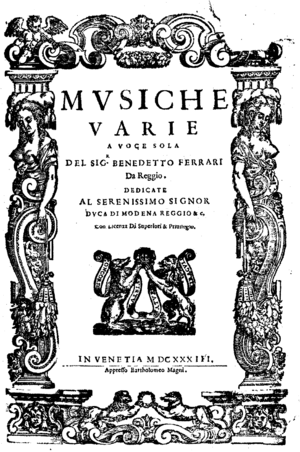Difference between revisions of "Occhi miei che vedeste"
| (16 intermediate revisions by the same user not shown) | |||
| Line 32: | Line 32: | ||
| written = <!-- {{Timeline-event|date={{Start date|YYYY|MM|DD|df=y}}|end_date={{End date|YYYY|MM|DD|df=y}}|location=}} --> | | written = <!-- {{Timeline-event|date={{Start date|YYYY|MM|DD|df=y}}|end_date={{End date|YYYY|MM|DD|df=y}}|location=}} --> | ||
| text = | | text = | ||
| libretto = {{ | | libretto = {{plainlist| | ||
*Benedetto Ferrari | *[[Gian Francesco Busenello]] | ||
*[[Benedetto Ferrari]] | |||
*[[Giovanni Battista Guarini]] | |||
*[[Giambattista Marino]] | *[[Giambattista Marino]] | ||
*[[Ottavio Orsucci]] | *[[Ottavio Orsucci]] | ||
}} | }} | ||
| language = | | language = | ||
| Line 63: | Line 64: | ||
| Audio sample? = <!-- Set to yes if an audio sample is needed, places page in [[Category:Song articles missing an audio sample]] --> | | Audio sample? = <!-- Set to yes if an audio sample is needed, places page in [[Category:Song articles missing an audio sample]] --> | ||
}} | }} | ||
'''"{{lang|it|Occhi miei che vedeste}}"''' is a plaint written and composed by [[Benedetto Ferrari]] and is contained in Book I of his ''[[Musiche Varie]]'', published in 1633.<ref name="OPAC"/><ref name="Wiki"/><ref name="IMSLP"/> The words are by [[Giovanni Battista Guarini]]. | |||
It appears on the following album: | It appears on the following album: | ||
| Line 90: | Line 91: | ||
| english-title = My eyes, when you saw | | english-title = My eyes, when you saw | ||
| composer = [[Benedetto Ferrari]] | | composer = [[Benedetto Ferrari]] | ||
| lyricist = | | lyricist = [[Giovanni Battista Guarini]] | ||
| work = [[Musiche Varie]], Book I | | work = [[Musiche Varie]], Book I | ||
| role = | | role = | ||
}} | }} | ||
{{Clear|left}} | {{Clear|left}} | ||
<div class="wrapperlibretti"> | <div class="wrapperlibretti"> | ||
| Line 99: | Line 100: | ||
{{Libretti | {{Libretti | ||
| country =Italy | | country =Italy | ||
| language-note = | | language-note =Modern Italian | ||
| libretto-text =<poem>{{lang|it|Occhi miei, che vedeste | | libretto-text =<poem>{{lang|it|Occhi miei, che vedeste<sup>1</sup> | ||
Il bell'idolo vostro in preda altrui | Il bell'idolo vostro in preda altrui | ||
Perché non vi chiudeste? | Perché non vi chiudeste? | ||
E tu anima mia | E tu anima mia perch'al gran duolo | ||
Non ten fuggisti a volo? | |||
Non | |||
Ahi che posso ben dire | Ahi che posso ben dire | ||
Che il soverchio dolor non fa morire.}}</poem><poem> | |||
The verses and capitalization follow the version of the poem published in 1737. <ref name="GuariniOpere"/> | |||
</poem> | |||
}}{{Libretti | }}{{Libretti | ||
| country =United Kingdom | | country =United Kingdom | ||
| language-note = | | language-note = | ||
| libretto-text =<poem>My eyes, when you saw | | libretto-text =<poem>My eyes, when you saw | ||
your beautiful idol in the | your beautiful idol in the claws of others, | ||
Why did you not close yourselves? | Why did you not close yourselves? | ||
And you, my soul, | And you, my soul, why did you not fly | ||
why did you not fly | |||
from the great grief? | from the great grief? | ||
Ah, what can I say – | Ah, what can I say – | ||
| Line 123: | Line 124: | ||
{{Libretti | {{Libretti | ||
| country =Italy | | country =Italy | ||
| language-note =Ancient Italian | | language-note =Ancient Italian (Manuscript) | ||
| libretto-text =<poem>{{lang|it|Occhi miei che vedeste | | libretto-text =<poem>{{lang|it|Occhi miei che vedeste<sup>1</sup> | ||
il bell'idolo vostro in preda altrui | il bell'idolo vostro in preda altrui | ||
perche non vi chiudeste | perche non vi chiudeste | ||
e tu anima mia | e tu anima mia perch'al grā duolo | ||
perch'al | |||
non te'n fuggisti à volo | non te'n fuggisti à volo | ||
ahi che posso ben dire | ahi che posso ben dire | ||
ch'il soverchio dolor non fà morire.}}<ref name="IMSLP1"/> | ch'il soverchio dolor non fà morire.}}<ref name="IMSLP1"/> | ||
</poem><poem> | |||
<sup>1</sup>) This is the text as it appears in the sheet music. | |||
</poem> | |||
}}{{Libretti | |||
| country =Italy | |||
| language-note =Ancient Italian (Poem) | |||
| libretto-text =<poem>{{lang|it|Occhj miei che vedeste<sup>1</sup><sup>2</sup> | |||
Il bell'idolo vostro in preda altrui. | |||
Come allor ambedue non vi chiudeste? | |||
E tu anima mia come al gran duolo | |||
Non ten fuggisti a volo? | |||
Ahi che posso ben dire | |||
Che il soverchio dolor non fa morire.}}<ref name="GuariniOpere"/> | |||
</poem><poem> | |||
<sup>1</sup>) This is the poem that Ferrari used as a libretto. The author was unknown to him. This version was published in 1737.<ref name="GuariniOpere"/> | |||
<sup>2</sup>) "Ochj miei": The "i lunga" replaces the double "i" that would logically appear in the plural (but doesn't). | |||
</poem>}} | </poem>}} | ||
{{Clear|left}} | {{Clear|left}} | ||
</div> | </div> | ||
{{Clear|left}} | |||
==Manuscripts and sheet music== | ==Manuscripts and sheet music== | ||
| Line 193: | Line 210: | ||
|quote= | |quote= | ||
}} </ref> | }} </ref> | ||
<ref name="GuariniOpere"> | |||
{{cite book | |||
|last= | |||
|first= | |||
|author-link= | |||
|date={{date |1737}} | |||
|title=Delle Opere del Cavalier Battista Guarini. Tomo Secondo. Nel quale si contengono Le Rime stampate ed'Inedite. | |||
|url=https://www.google.de/books/edition/Delle_Opere_Del_Cavalier_Battista_Guarin/ejZeAAAAcAAJ?hl=de&gbpv=1 | |||
|location=Verona | |||
|publisher=Giovanni Alberto Tumermani | |||
|page= <!-- or pages= --> | |||
|isbn= | |||
}} | |||
</ref> | |||
<ref name="FR">English translation by FR (Lankin), 2021</ref> | <ref name="FR">English translation by FR (Lankin), 2021</ref> | ||
<ref name="VC">Linguistic advice: VC, | <ref name="VC">Linguistic advice: VC, 2021</ref> | ||
}} | }} | ||
[[Category:17th-century music]] | [[Category:17th-century music]] | ||
[[Category:secular]] | [[Category:secular]] | ||
Latest revision as of 01:34, 1 October 2021
| Musiche varie | |
|---|---|
| by Benedetto Ferrari | |
 Musiche varie a voce sola, book one | |
| Full title | Musiche varie a voce sola |
| Libretto | |
| Published | 1633–1641 |
"Occhi miei che vedeste" is a plaint written and composed by Benedetto Ferrari and is contained in Book I of his Musiche Varie, published in 1633.[1][2][3] The words are by Giovanni Battista Guarini.
It appears on the following album:
| Year | Album | Ensemble | Conductor |
|---|---|---|---|
| 2003 | Musiche Varie (Album) | Ensemble Artaserse | Philippe Jaroussky |
Libretto
from Musiche Varie, Book I
Benedetto Ferrari (music), Giovanni Battista Guarini (words)
Modern Italian | |
Occhi miei, che vedeste1 The verses and capitalization follow the version of the poem published in 1737. [4] | |
Ancient Italian (Manuscript) | |
Occhi miei che vedeste1 1) This is the text as it appears in the sheet music. | |
Ancient Italian (Poem) | |
Occhj miei che vedeste12 1) This is the poem that Ferrari used as a libretto. The author was unknown to him. This version was published in 1737.[4] | |
Manuscripts and sheet music

- "Benedetto Ferrari". IMSLP. Retrieved September 21, 2021.
References
- ↑ "Benedetto Ferrari". OPAC. Retrieved September 21, 2021.
- ↑ "Benedetto Ferrari". Wikipedia. Retrieved September 21, 2021.
- ↑ 3.0 3.1 "Benedetto Ferrari". IMSLP. Retrieved September 21, 2021.
- ↑ 4.0 4.1 4.2 Delle Opere del Cavalier Battista Guarini. Tomo Secondo. Nel quale si contengono Le Rime stampate ed'Inedite. Verona: Giovanni Alberto Tumermani. 1737.
- ↑ English translation by FR (Lankin), 2021
- ↑ Linguistic advice: VC, 2021
- ↑ "Benedetto Ferrari, Musice Varie, Book one: RISM A/I: F 265". IMSLP. Retrieved September 21, 2021.